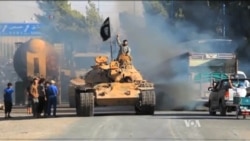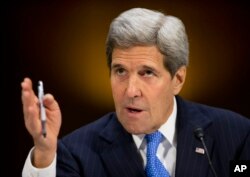U.S. Secretary of State John Kerry called on Congress Wednesday to approve President Barack Obama's war powers request for the authority to use military force against Islamic State militants.
"We simply cannot allow this collection of murderers and thugs to achieve its ambitions," Kerry told members of the Senate Foreign Relations Committee, noting that Islamic State had captured large portions of land in Iraq and Syria, threatening "the death or submission of all who oppose it" and "the incitement of terrorist acts across the globe."
Interrupted at one point by the shouts of anti-war protesters in the hearing room, Kerry went on to tell lawmakers that the United States has to present a united front against Islamic State.
“They have to understand that they can’t divide us," he said. "Don’t let them.”
In addition to Kerry, Defense Secretary Ashton Carter and the chairman of the Joint Chiefs of Staff, General Martin Dempsey, addressed the Foreign Relations Committee.
The meeting was part of a long process toward any authorization, which would need to clear both the full Senate and House of Representatives.
Obama last month proposed an authorization of force that would last three years with limits on the use of ground troops, barring them from sustained, long-term, offensive combat.
Varying views
There has been pushback against the president's plan from Republicans who disagree with limiting the use of ground troops, as well as from Democrats who do not want to see the use of any forces on the ground.
The panel's top Democrat, Senator Bob Menendez of New Jersey, said Obama's proposal was vague and lacked a clear exit strategy.
“What Democrats are not willing to do is to give this or any other president an open-ended authorization for war, a blank check,” he said.
Committee Chairman Bob Corker, a Tennessee Republican, said the authorization, as written, probably does not go far enough.
“The authorization for the use of military force that has been sent up is one that is limited in some ways, both in duration and relative to the activities that the commander in chief, through you, can carry out,” he said.
Corker, who was recently in Baghdad and Irbil, said everything Washington has done to combat Islamic State is benefiting Iran.
Carter, the secretary of defense, argued that the proposed authorization would provide the authority and flexibility needed to go after Islamic State fighters and their affiliates beyond the Iraqi and Syrian borders.
The Islamic State group "is likely to evolve strategically, morphing, rebranding and associating with other terrorist groups while continuing to threaten the United States and our allies,” he said.
Battles continue
Wednesday’s hearing took place as U.S. airstrikes continued to pound Islamic State militants in Syria and Iraq, and while Iraqi security forces and Shia militias were fighting to regain control of Tikrit. At the same time, Islamic State fighters launched a major offensive along the Syrian-Turkish border.
The U.S. military has been carrying out airstrikes since August in Iraq and since September in Syria as the lead in an international coalition against the militant group.
So far, according to Pentagon data, the coalition has conducted more than 2,700 airstrikes against targets such as artillery and fighting positions, vehicles and storage facilities used by the militants.
The president has said those operations do not need any new authorization and are instead covered by a measure passed following the September 11, 2011, terrorist attacks.
VOA's Sharon Behn contributed to this report from the State Department. Some material for this report came from AFP.







